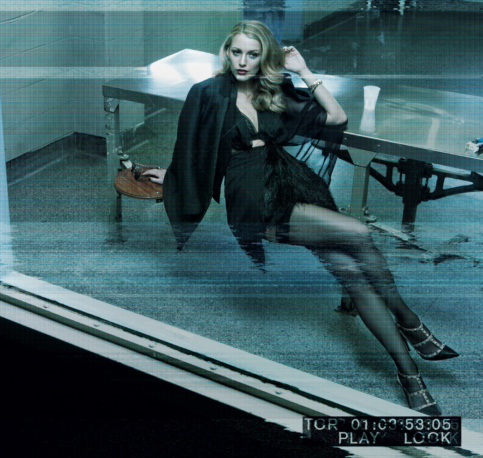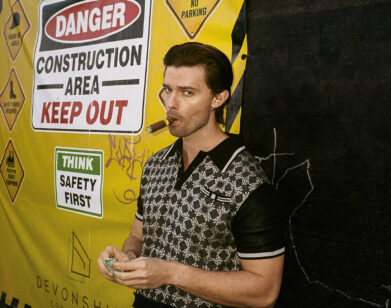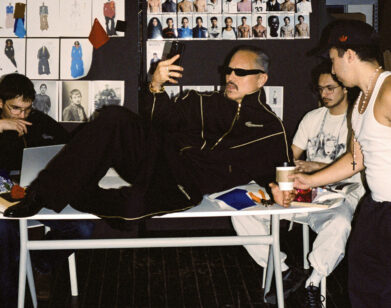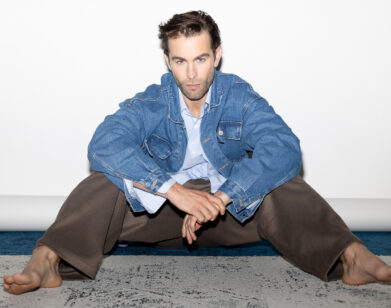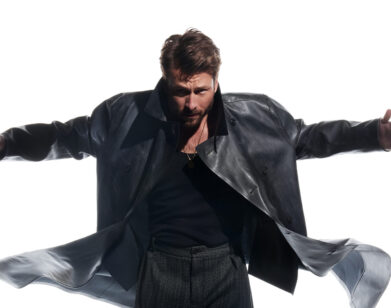Blake Lively
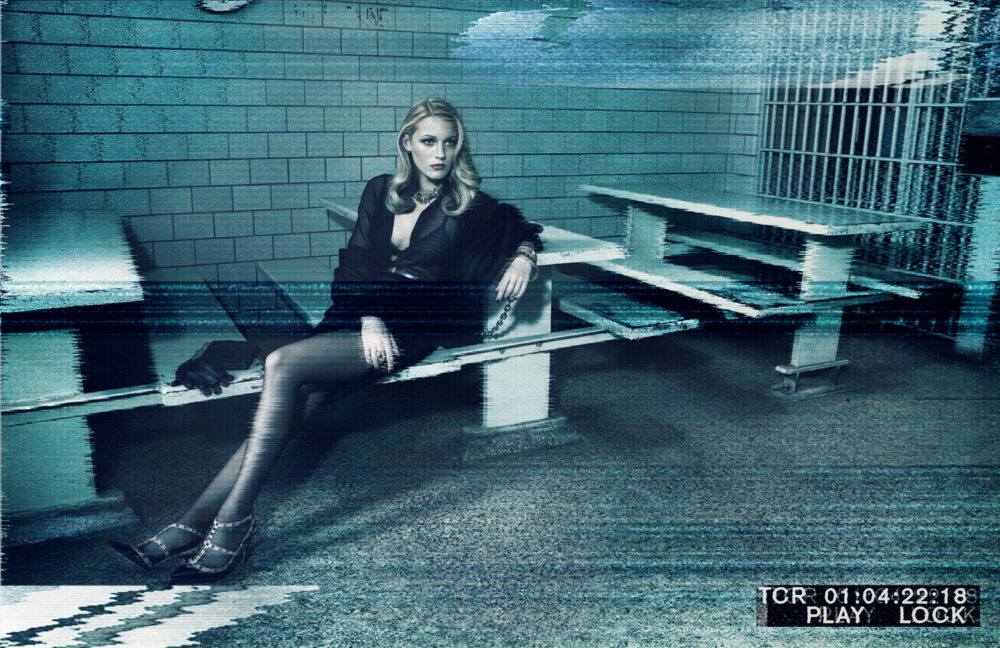
Serena van der Woodsen: a beautiful, glamorous, elegant young woman about town; fashionable and firm but fair ruler of Manhattan’s young social elite; wooer of hearts and slayer of men with names like Trip van der Bilt; tabloid magnet and off-and-on dater of her off-and-on step-brother-and nothing even remotely like Blake Lively. For three seasons, Lively-owner of the most talked-about hair in television since the heady days of the early-Friends Jennifer Aniston shag-has played van der Woodsen on the CW’s hit series Gossip Girl, guiding her through myriad breakups, scandals, falls from grace, and spirited comebacks amidst the show’s hyperreal vision of misspent youth in uptown New York. Now as the series enters its fourth season, the plot for Serena has begun to further thicken. Will she return from her summer vacation in Paris as a new woman, or out to settle old scores? Will she get back together with Dan? Will Nate come calling once again? What will she wear? But just as the arc of Serena’s sordid life on Gossip Girl has brought about new priorities, changes, and directions, so too has the trajectory of Lively’s career away from the show signaled a shift in direction for the 23-year-old actress.
Born in Tarzana, California, and raised in Burbank, Lively grew up in a show-business family: Her father, Ernie, has had a long career as a character actor; her mother, Elaine, is a talent manager; and her older siblings Eric, Robyn, Jason, and Lori are all current or former actors. (Ed. note: Robyn memorably performed a now somewhat iconic rap in the ’80s film Teen Witch.) Five years ago, at the age of just 17, she made her acting debut alongside Alexis Bledel, America Ferrera, and Amber Tamblyn in the sleeper hit The Sisterhood of the Traveling Pants (2005), a film about a group of teenage girls who, as groups of teenage girls are wont to do in movies, pass around and each wear a pair of jeans that remarkably fits everyone over the course of one very special summer. Roles in little-seen movies such as Accepted (2006), Elvis and Anabelle (2007), as well as a Traveling Pants sequel (2008) followed.
Recently, though, Lively’s work has taken on a decidedly more ambitious scope. She shared the title role with Robin Wright in last year’s The Private Lives of Pippa Lee, Rebecca Miller’s offbeat drama about a woman in the throes of a midlife crisis who recalls her youth as she sets off to rediscover who she is and what she wants (Lively played the younger version of the character). She also spent four months earlier this year in New Orleans playing the female lead in Green Lantern, Martin Campbell’s reimagining of the masked comic-book superhero whose green ring confers its wearer with certain all-consuming powers. (As comic book aficionados know, there have been several Green Lanterns-the one in Lively’s film is played by Ryan Reynolds.)
Perhaps the most radical role Lively has taken on yet comes in this month’s heist thriller The Town. Directed by Ben Affleck and based on Chuck Hogan’s novel Prince of Thieves, the film follows a crew of men from the blue-collar Boston neighborhood of Charlestown who conspire to rob a bank. The crew is headed up by Doug MacRay (Affleck), a local career criminal with strong ties to the neighborhood-so strong, in fact, that the neighborhood itself, its members bound together by an implicit code of silence, provides a sort of safe house for the men as the FBI pursues them. Things get more complicated when MacRay becomes infatuated with the bank manager (Rebecca Hall) he held at gunpoint during the heist. As his team sets off on a cat-and-mouse game with the FBI, he develops a difficult, if not entirely unrequited relationship with her that serves as the centerpiece of the film’s dramatic tension. Lively plays MacRay’s troubled ex-girlfriend, Krista, who couldn’t be more un-Serena van der Woodsen-like as a hard-bitten but self-destructive 29-year-old single mother who deals drugs to get by and still harbors feelings for her disengaged, distracted former flame (although, at the rate she’s going, Serena might get there eventually).
With a heavyweight cast rounded out by Jon Hamm, Jeremy Renner, and Chris Cooper, The Town represents a turning point for Lively: the opportunity to play a character role in a substantial film that, perhaps more than anything she has done thus far, has forced her to venture beyond her comfort zone-and preparing for it required Lively to go to some places that Serena van der Woodsen, even at her most desperate, would fear to tread. Affleck recently caught up with Lively as she flitted between the set of Gossip Girl and the couture-week fashion shows in Paris.
BEN AFFLECK: Somebody told me that you’re in Paris now. Is that true?
BLAKE LIVELY: Yeah, I’m in Paris!
AFFLECK: Are you liking it?
LIVELY: Oh, my gosh, it’s so amazing here. It’s couture fashion week, so it’s been like a fairy-tale Paris experience.
AFFLECK: You don’t have to tell me . . .
LIVELY: [laughs] Oh, my goodness . . . I have to leave on Saturday. I was in New Orleans for four months shooting Green Lantern, so it’s a nice transition back to New York-you know, because of all the French influence.
AFFLECK: You’ve been to Paris before?
LIVELY: Yeah. I went to Paris for the first time with my brother when I was 15. He thought I should be more cultured, so he convinced my parents to let me out of school for a week and a half, but we ended up traveling around Europe for two months. We went to London-to Cambridge. We went to Cologne, Brussels, Rome, Florence . . . We stayed everywhere from hostels to nice hotels. Then we ran out of money, so we had to sneak all the way back to London on trains to take our flight back home. So it was a very different experience. [laughs]
AFFLECK: It sounds like a great experience.
LIVELY: It was. You know, running around in wet clothes when it was freezing outside and staying in these hostels . . . And, of course, I packed way too much. We were backpacking, and I had all of my fancy stuff. But it was fun being out on my own for the first time at 15. It was very different from going to fashion shows and wearing ball gowns. As wonderful as it is, I actually think I preferred doing it the other way.
AFFLECK: Is this the same brother I met?
LIVELY: Mm-hmm . . . Eric. He’s the one who got me into acting.
AFFLECK: He got you into acting?
LIVELY: Yeah. When we were in Paris, every time we would stop to eat . . . This is a bold sentence for me, but I would dread eating, because every time we sat down for a meal he would start questioning me, saying, “What are you going to do for a living? What do you think you want to do?” He was just being a good big brother. Because of my interests, he decided that I should be a film producer. I did not want to be an actor because my whole family did it-going into the family business was the last thing I wanted to do. But then about a year later he was running lines with his friend and he talked me into going to this audition. I just did the first one to be nice because he was always so great to me, but then I ended up going to a few more auditions. I didn’t have an agent. I would just write down that I was with my brother’s agency, and then the agency would get calls and say that they had no idea who I was. But after a few auditions, I got The Sisterhood of the Traveling Pants, which was my first job.
AFFLECK: That was a big hit movie, right? I mean, it was successful.
LIVELY: Well, I mean, yeah! It was on par with Avatar . . . I mean, for its time. [laughs] Avatar has exceeded it now.
AFFLECK: The blue traveling pants.
LIVELY: Yes, they were blue-and the characters were blue because they weren’t with each other.
AFFLECK: But it was really successful. You did a sequel, The Sisterhood of the Traveling Pants 2.
LIVELY: Yes, it was successful. It was an amazing first job. And all I had to do was miss finals at school? So I thought, “Well, this is great. I’ll just try out acting and see if I like it.” I missed my finals, I was away shooting for the summer, and I came back home. But rather than pursue acting, I decided that I wanted to finish out my senior year. I thought I’ll finish high school and then I’ll hold off going to college for a year and just try it. But here I am still acting. Things worked out all right.
AFFLECK: So far, so good. You come from a whole acting family. Did you ever feel kind of down on it? I mean, I was a child actor, so I know there was a definite downside to it for me, although I started a bit younger than you did. It sounds like you had a pretty good experience, so maybe you didn’t feel this way.
LIVELY: I have a big, close, loving family, and they’re all from the South, but because so many of them are actors, everyone was very normal about it. It was just like any job to them. They always came home and talked about it around the dinner table the way any family talks about work, but it wasn’t anything special. I think for a lot of people, acting becomes a lifestyle, especially when you’re living in Los Angeles. But despite the fact that my family moved to L.A. and I grew up there-in Burbank, which is like a small town inside of a big city-I don’t feel like I ever had any sort of Hollywood upbringing. So I don’t remember there ever being a downside. There were only upsides. I got to travel and visit my family on set. I got to eat craft service. I actually think that was the reason I got into acting: free food. I literally remember on my first job being like, “Yes! I get to have craft service every day!”
AFFLECK: Are your parents involved in your career? Are they supportive?
LIVELY: No. [deadpan] They disowned me.
AFFLECK: Well, there’s a spectrum, right? I’m sure they were very involved when you were younger, and then you had to make some segue or transition away from that.
LIVELY: They were as involved in my life as any parents are in any person’s life. It was always important to them when I was growing up. I didn’t start acting until I was 16, but when I was a kid people always asked why I didn’t act like the rest of my family, and they would say, “Well, she needs a childhood! We would never allow her to do that even if she wanted to.”
AFFLECK: But they didn’t stop you from pursuing your first job.
LIVELY: No. I got my first job when I was 16, but I didn’t get another one until I was 17, after I was done with high school.
AFFLECK: We met when you came to do The Town, and when you turned up, I was a little taken aback. I was like, “How did you learn this Boston accent? How did you learn all of this stuff?” Which I thought was hard to get because I had been doing readings with all of these actresses in New York and L.A., and it was just hard to find the right person. You were by far the best, and when I asked you how you got everything down, it turned out that you had tried to work with this one dialect coach, and then tried another one, and then just started doing all of this incredibly thorough, diligent, independent research on your own-seeking out people who spoke the way your character does, seeking out people whose own life experiences you could draw upon. How did you get to the point where that became your approach? Because it’s certainly nothing I ever did at any point in my twenties. Where does that instinct come from?
LIVELY: I don’t know. I think it comes from the fact that I never really thought about acting as a child. It wasn’t like, “This is the career that I want to pursue.” So when I first started acting, I was more concerned with just being on a set and all of the woes of that, and I didn’t really know it or understand it as a craft yet. When I saw my first movie, I was fine, but I thought, “Oh, my heavens. It’s not about just standing there on my mark and saying these lines. I need to actually act.” It was great to have my first opportunity be such a big role, but also not great because all of the mistakes I made-the entire learning process was on the big screen for everyone to see. That’s been something, movie by movie, that I’ve been able to grow and learn from-that I always need to work harder to be better because it’s still a new craft for me.
AFFLECK: Did anyone help you learn that?
LIVELY: I just did it on my own. I’ve never worked with an acting coach, but my parents had acting classes and I grew up around them my whole life just because I didn’t have a babysitter. I’m actually a very shy person-that’s a big secret, so don’t tell-but being in those classes pushed me to break out of that a little bit. It’s like nature versus nurture: I’m naturally very shy, but I was brought up in a way where I had to get up and get out of that.
AFFLECK: I wouldn’t really describe you as shy. That hasn’t been my experience of you.
LIVELY: Well, I had to be bold with you! I had to be brave because this role was terrifying. But it was all smoke and mirrors because I read the script and I didn’t know how I couldn’t do it. I loved this character so much. I was a little selfish in wanting to do it because I also thought, well, maybe I’m not the best person for this, but I really want it. I didn’t know how to do a good Boston accent, so I went and got a dialect coach, and she was really good, but it was a real proper accent I was learning, and my character is from the projects. But she’d lived in Charlestown her whole life, and the kind of accent she would have had is very different from an across-the-board Boston accent. So one of my best friends, Jennifer, who is a hairdresser on Gossip Girl, is from Boston and she had her family come down to New York one weekend.
AFFLECK: Where are they from?
LIVELY: Dorchester-or Dorchestah, I should say.
AFFLECK: It’s good to be represented on Gossip Girl.
LIVELY: Oh, she represents big-time. But it helped that I’d been around her for years. It gave me a foundation to not only do this character but also to try to capture something more complex about her. I had a greater appreciation for who she is. So anyway, I sat with Jennifer’s family and had them each say things to me over and over. I was so embarrassed, but I heard what I needed to hear.
AFFLECK: You also seemed to understand that it wasn’t just about an accent necessarily, but a certain worldview.
LIVELY: Well, the accent you can always work on, but it was the heart of the character that I felt like I had to capture. You can look at her as a bad person, or you can look at her as a good person who has been put in certain circumstances and does what she needs to do to get by. But whereas in a story she might be considered the bad guy, I just don’t believe that things are that simple in life. I think certain people are the way they are for certain reasons that we can’t necessarily judge without knowing. So that’s how I approached it.
AFFLECK: You brought a sense of complexity and nuance to the character that I felt was really important. And then I also found it impressive that even though your schedule on Gossip Girl was really tight, you made the time to come to Boston and do some firsthand research.
LIVELY: Well, I had to come to Boston because they told me, “Ben said you have to come to Boston if you want the part.” [laughs]
AFFLECK: That’s not true. They said I wasn’t interested? Really?
LIVELY: Well, no. They just said, “Ben is not going to come to New York. You’re too young for the part, but if you feel like you want to pursue this, you can take a train to Boston.”
AFFLECK: And you did, which I thought was cool. You spent a lot of time with some of these girls from the real projects who showed you around and showed you their lives. You got into a whole world that I imagine is very different from Burbank-and probably very different from what you experienced on Traveling Pants. What was that like? Were you nervous? Were you excited?
LIVELY: For me, this job was so great because it wasn’t just about what I did onscreen-every day was a journey. It’s interesting because as actors we’re in a position where we can go and experience other peoples’ lives a little bit-even if it’s just a drop of what it is. So for me, personally, it was really amazing to experience something that’s unlike anything I’d ever experienced. These girls were so kind to me. We just kind of hung out. They weren’t excited about me being on Gossip Girl. They couldn’t have cared less. They were actually kind of motherly-even though many of them were only 16 years old. They’re hard as nails but in a really wonderful, positive way. So we just hung out at their houses in the projects and they told me stories about their families and husbands and cousins who were bank robbers, and how this person ended up in jail and ratted on that person, and about the code of silence-which, for people who don’t know, is a way certain criminals were able to avoid being arrested. There’s this old-school idea of, it’s not your problem, you stay out of it. These girls live in such a small world that there’s a little bit of a time warp. It’s contained in a lot of ways and the families are so close because they’ve lived together for generations. There’s this really strong Irish blood there. It’s like there’s a sense of family with each other. Then, when I was talking to them about death . . . We were walking around one day and there was a baseball game going on in a park for this boy who was 16 and had just been murdered, and everybody was happy and celebrating him and wearing T-shirts with his name on them. I thought, “In my town, if something like this had happened, everybody would just be a disaster, and saying how tragic it is. People wouldn’t be able to recover.” But here it was more of a celebration of this boy’s life. It wasn’t that people weren’t sad about it. They would just say, “It’s something that happens and we need to be able to move on with life. We still have all these kids around us, and we still have to be parents and siblings for them.” It was such an interesting thing for me to tap into, that mindset.
AFFLECK: One of the girls you spent time with was the girlfriend of a guy who is in prison for armed robbery and who I based the main character on in a lot of ways. She told me that she was driving around in the car with you through the projects and she would see a friend of hers on the street and she would be like, “I got Hollywood in my car!”
LIVELY: [laughs] Oh, god. She was amazing. That’s true.
AFFLECK: A lot of the people you based the character on came to the set to watch you work.
LIVELY: Well, you hired them as extras!
AFFLECK: But they approved of what you were doing-they liked it.
LIVELY: They liked it, but I was scared. I really didn’t want to fail them. They would come in between takes and direct me. [laughs] They’d give me syllable readings.
AFFLECK: I know. I had to be like, “You know what guys? Thank you, but . . .”
LIVELY: They only did that a couple of times. They would come up and say, “You’re doing great, but it’s Chaahhlstown, not Charlestown.”
AFFLECK: You know, before we did The Town, I wasn’t super-familiar with everything you’d done.
LIVELY: You weren’t?
AFFLECK: Well, I was a fan of yours, but I didn’t have the full, in-depth familiarity. But then I got to see The Private Lives of Pippa Lee on DVD, and I just thought all of the acting in that film was great. It was directed by Rebecca Miller, and she’s super-heavy-duty. What was she like to work with?
LIVELY: Oh, gosh. She’s such an incredible woman. She’s one of the most interesting people I’ve ever met. The script was really wild. It was entirely hers, because she wrote the book that the film was based on, and she’d worked with the story for so many years. The movie is a woman’s story, and it contains all these vignettes and interactions that she has experienced throughout her life, but it’s told in such a different way. I said to Rebecca, “The script is great, but it’s a little wild. How do you expect people to connect to something that’s so out there at times?” And she said, “Most people’s version of reality is two people sitting in a room, and it’s bare, and they’re sitting there, and it’s simple and they’re just having a conversation. But to me that’s not reality at all. When I’m sitting in a room, talking, there are all of these things going on in my head. There are all these thoughts and emotions and bubbles and colors.” She said, “This isn’t a story about anybody except for this one woman, and that’s what’s happening in her mind. To me, that’s reality.”
AFFLECK: See, if I were a real director, I would have said something informed and brilliant like that. I was just like, “I don’t know. Come on, let’s shoot.” So I was basically right to feel insecure.
LIVELY: [laughs] I don’t know if you should have felt insecure, but I would call Rebecca between scenes on our film and say, “Ben’s telling me to do this thing, but he’s so wrong.”
AFFLECK: I remember one scene we shot that was really important. It was a scene with you and Jon Hamm in this bar. It meant a lot to me-I had really been anticipating it. You had the Pippa Lee premiere that night and you really wanted to be there. It was important to you. So you said to me, “Listen, I would like to be able to go to this thing. Do you think we’ll get done in time?” And I said, “Yeah, we’re going to be able to get you out. The scene is only going to take six hours to shoot.” We got to the middle of the six hours and we hadn’t even gotten your coverage done-it was clear that you weren’t going to make it. But instead of complaining or being upset, you stayed, and were there, committed to getting the scene right. I thought that revealed a lot about who you are as an actress and the kind of focus and attention you have. I think there’s a tension in those choices between the work that you have to do, and the things that will make that work better in my experience anyway. And as you get more successful, the tension only gets greater as you’re pulled in all of these different directions. How do you anticipate navigating that tension?
LIVELY: I love what I do. I love my work. So, you know, of course, I wanted to be at the premiere, but I had a job to do, and so I had to be on the set in Boston and be a part of it. At the end of the day, a premiere is a premiere. It’s not somebody living or dying. So for me, this other stuff-well, the perks-is not the reason I do the job. Couture fashion week, getting to meet Karl Lagerfeld and John Galliano and Christian Louboutin is so exciting. It’s like being a little girl and looking at these designers saying, “Can you imagine one day seeing all of those ball gowns?” But at the end of the day, I wouldn’t be there without my job. There are a few things in life that matter above all else: your family, your friends, your loved ones. But everything else comes and goes-especially in this business where everything is so of the moment.
AFFLECK: Is there anyone whose career you admire?
LIVELY: People always ask me that and I always answer with men. Which is not to say that there aren’t incredible women in this business, but I feel like men are still given much better opportunities. I feel like there are so many people I admire for so many reasons that I can’t look at one person’s life and say, “I want that life.” I want to make my own history.
AFFLECK: I always have to remind myself how young you are. You were 3 when Good Will Hunting [1997] came out.
LIVELY: [laughs] Not quite.
AFFLECK: And you’ve never even seen it. That felt good to me.
LIVELY: You were in Good Will Hunting?
AFFLECK: But you have your head on pretty straight. You and I had to do a sex scene on the first day of shooting, and you were very poised and comfortable about it more- mature than some of the crew members.
LIVELY: Well, I have a big family and no one ever treated me like a child. They always treated me like an adult, like an equal. But with acting, I think half of it is just acting confident. We stand on these red carpets and pose in these dresses, but we’re all only so confident. It doesn’t mean we think we’re great looking or anything. It’s all a façade. But the sex scene was really awkward. It was my first day, so thank you for that.
AFFLECK: You’re welcome.
LIVELY: I guess it was good to break the ice. [laughs]
AFFLECK: So before you got to Paris, you were down in New Orleans doing Green Lantern, which is a big Hollywood superhero movie. You’re playing the secretary of the Air Force or something?
LIVELY: Secretary? I own the company! I play a fighter pilot. Are you intimidated now?
AFFLECK: So you’re playing a much older character-a person with a lot of responsibility in regards to airplanes and that kind of stuff.
LIVELY: Did you see Pearl Harbor [2001]? My character has the same kind of position as the lead character in that.
AFFLECK: [laughs] Funnily enough, that doesn’t bring anything to mind. I must have blacked that out. So who’s more attractive: Jon Hamm or Ryan Reynolds?
LIVELY: Pete Postlethwaite.
AFFLECK: See, that’s the quote that’s going to get pulled out and be in bold letters above the interview. So when people read it, they get to this part of the conversation and they say, “Well, that was just bullshit.” [Lively laughs] I do have to say though, Pete Postlethwaite is an attractive guy. He is fabulous. And Green Lantern sounds pretty good.
LIVELY: Oh, my gosh. Martin Campbell, our director, has been incredible. He’s one of the hardest-working people I’ve ever met. He spent a lot of time working with us, trying to create the main storyline between these two people so there is something you can connect within the middle of everything else. This is sounding not so interesting anymore, the way I’m talking about it . . . Things blow up.
AFFLECK: So how old are you really?
LIVELY: I’m 23.
AFFLECK: You’re 23. When you look at the future and the choices you’re going to make, do you think at all about how you want to approach them?
LIVELY: I look at anything in life like as long as you do what you believe in, then it’s going to work out. Because even if other people don’t like what you’re doing, you’re happy because you did what you believed in.
AFFLECK: Well, that was the last question. I didn’t get to some others I wanted to ask you, like, “Which day did you find yourself most impressed by me?”
LIVELY: Or am I happy that you don’t wear cashmere turtlenecks anymore.
AFFLECK: Oh, Jesus Christ. I don’t know what pictures you’re looking at. How about: Would you work with me again? When your price is too expensive, can I hire you for scale? I want you to say it now so it’s in a magazine.
LIVELY: Oh, gosh. You’re so tacky! I told you already that I’d never work with you again. Jason Bourne maybe.
AFFLECK: Do you remember when you and I had worked together for months and we were wandering around in Boston and at one point I just randomly pointed to a place and said, “Matt Damon lived there.” And you turned to me and were like, “What? You know Jason Bourne?” [Lively laughs]
LIVELY: Of course I’ll work with you again.
AFFLECK: I’m going to introduce you to Jason Bourne so that you’ll be grateful.
LIVELY: I’m already grateful.
AFFLECK: Now stop trolling the Internet looking for pictures of me and critiquing my wardrobe. Before I went to do this interview somebody said, “Blake is a fashion darling.” All of us can’t be fashion darlings, Blake.
LIVELY: Well, people like you make me fashionable, because if there is no wrong there can be no right.
AFFLECK: You’ve gotten so much more bitchy since we wrapped the film.
LIVELY: But I think you have to say that I’m charming at the end of the interview. I think that’s the rule.
AFFLECK: You’re very charming.
LIVELY: Actually, I think they usually like to end these interviews on a funny note.
AFFLECK: I’m not sure that I said anything funny. Maybe you did.
LIVELY: Maybe they’ll just have someone else redo the interview.
AFFLECK: Okay, then. I’m going to let you go. I can hear the Gossip Girl people banging on your trailer door because you’re holding up the whole production doing this interview. This is how you get a bad reputation: You stay on the phone doing interviews.
LIVELY: I’m actually not in a trailer. I’m in a hotel room with no air conditioning. It’s very special.
AFFLECK: That’s the charm of Europe. What can I say?
LIVELY: That’s going to be the quote right there: “Ben Affleck says things don’t work well in Europe.”

